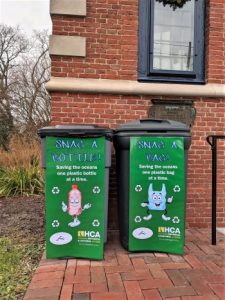Consumers and some businesses in Delaware will no longer be able to use or distribute single-use plastic carryout bags at the point-of-sale starting January 1. Plastic carryout bags are commonly used to take items home from convenience, grocery and other retail stores. The Delaware Department of Natural Resources and Environmental Control urges consumers to bring reusable bags to stores instead and to clean/disinfect those bags between uses.
The ban is designed to reduce beach and roadside litter, save landfill space, increase recycling efforts and help recycling facilities from having to shut down when plastic bags get stuck in the machinery.
“Each Delawarean uses about 434 plastic bags and that means nearly 2,400 tons of plastic bags end up in our landfills annually,” said DNREC Secretary Shawn Garvin. “A decrease by the public of plastic carryout bags can mitigate a large portion of this waste, and help our environment by reducing the amount plastic bags on our roads and waterways that can harm us and our wildlife.”
House Bill 130 implementing the ban was sponsored by 12 legislators led by Rep. Gerald Brady and Sen. Trey Paradee, and was passed in 2019 and signed by Gov. John Carney.
Retailers can choose to offer paper bags, or cloth bags, or a thicker type of plastic bag that is designed to be reusable. The law allows retail stores to charge a fee for the bags they provide at point of sale. DNREC advises consumers to wash or disinfect their reusable bags by turning them inside out and wiping them down with a disinfecting agent after each use.
Under the law, plastic carryout bags will no longer be available from larger stores (more than 7,000 square feet) as well as smaller stores with at least three locations in Delaware of 3,000 square feet each or more. Supermarkets and big-box stores are affected, as well as chains of convenience stores. Restaurants are not subject to the ban, nor are small stores with one or two locations.
All retail stores affected by the law are required to provide an At-Store Recycling program for plastic bags and other specific plastics, like cereal box liners, newspaper sleeves, and single-use produce or meat bags. The drop-off locations should be visible and accessible within the store. Bags that are no longer reusable or unwanted should be recycled at these locations. Plastic bags should not be placed in carts that are part of the state’s curbside recycling program but should instead be returned to stores for recycling.
Consumers and retailers can find more information at de.gov/bags .
About DNREC
The Delaware Department of Natural Resources and Environmental Control protects and manages the state’s natural resources, protects public health, provides outdoor recreational opportunities and educates Delawareans about the environment. The Division of Waste and Hazardous Substances ensures Delaware’s wastes are managed to protect human life, health, safety and the environment. For more information, visit the website and connect with DNREC on Facebook, Twitter or LinkedIn.
Media Contacts: Nikki Lavoie, nikki.lavoie@delaware.gov; Michael Globetti, michael.globetti@delaware.gov
###



